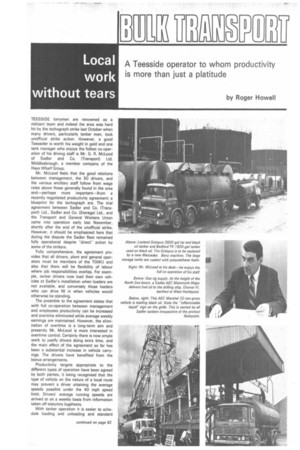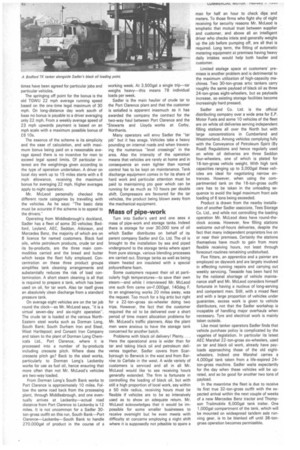Local work without tears
Page 83

Page 84

If you've noticed an error in this article please click here to report it so we can fix it.
TEESSIDE lorrymen are renowned as a militant team and indeed the area was hard hit by the tachograph strike last October when many drivers, particularly tanker men, took unofficial strike action. However, a good Teessider is worth his weight in gold and one tank manager who enjoys the fullest co-operation of his driving staff is Mr. G. R. McLeod of Sadler and Co. (Transport) Ltd. Middlesbrough, a member company of the Hays Wharf Group.
Mr. McLeod feels that the good relations between management, the 50 drivers, and the various ancillary staff follow from wage rates above those generally found in the area and—perhaps more important—from a recently negotiated productivity agreement: a blueprint for the tachograph era. The trial agreement between Sadler and Co, (Transport) Ltd., Sadler and Co. (Storage) Ltd., and the Transport and General Workers Union came into operation early last November, shortly after the end of the unofficial strike. However, it should be emphasized here that during the dispute the Sadler fleet remained fully operational despite "direct" action by some of the strikers.
Fully comprehensive, the agreement provides that all drivers, plant and general operators must be members of the TGWU and also that there will be flexibility of labour where job responsibilities overlap. For example, tanker drivers now load their own vehicles at Sadler's installation when loaders are not available, and conversely those loaders who can drive fill in when vehicles would otherwise be standing.
The preamble to the agreement states that with full co-operation between management and employees productivity can be increased and overtime eliminated while average weekly earnings are maintained. However, the elimination of overtime is a long-term aim and presently Mr. McLeod is more interested in overtime control, Certainly there is now ample work to justify drivers doing extra time, and the main effect of the agreement so far has been a substantial increase in vehicle carryings. The drivers have benefited from the bonus arrangements.
Productivity targets appropriate to the different types of operation have been agreed by both parties, it being recognized that the type of vehicle on the nature of a local route may prevent a driver attaining the average speeds possible under the 40 mph speed limit. Drivers' average running speeds are arrived at on a weekly basis from information taken off statutory logsheets.
With tanker operation it is easier to schedule loading and unloading and standard times have been agreed for particular jobs and particular vehicles.
The springing off point for the bonus is the old TGWU 22 mph average running speed based on the one-time legal maximum of 30 mph. On long-distance day work south of base no bonus is payable to a driver averaging only 22 mph. From a weekly average speed of 23 mph upwards payment is based on an mph scale with a maximum possible bonus of £6 10s.
The essence of the scheme is its simplicity and the ease of calculation, and with maximum bonus being paid on a reasonable average Speed there is no incentive for men to exceed legal speed limits. Of particular interest are the weightings given according to the type of operation undertaken. A driver on local day work up to 15 miles starts with a 6 mph allowance, receiving the maximum bonus for averaging 22 mph. Higher averages apply to night operation.
Mr. McLeod personally checked the different route categories by travelling with the vehicles. As he says: "The basic data must be accurate if the scheme is to appeal to the drivers."
Operating from Middlesbrough's dockland, Sadler has a fleet of some 30 vehicles; Bedford, Leyland, AEC, Seddon, Atkinson, and Mercedes Benz, the majority of which are on B licence for named customers. Black fuel oils, white petroleum products, crude tar and its by-products, are the three main cornmodities carried and the bread and butter which keeps the fleet fully employed. Concentration on these three product groups simplifies tank cleaning arrangements and substantially reduces the risk of load contamination. A short steam cleaning is all that is required to prepare a tank, which has been used on oil, for tar work. Also tar itself gives an absolutely clean discharge from a standard pressure tank.
On average eight vehicles are on the tar job round the clock—as Mr. McLeod says, "it is a virtual seven-day and six-night operation". The crude tar is loaded at the various NorthEastern steel works such as Dorman Long, South Bank; South Durham Iron and Steel, West Hartlepool; and Consett Iron Company and taken to the plant of Dorman Long Chem icals Ltd., Port Clarence, where it is processed into a number of by-products including creosote pitch. Where does the creosote pitch go? Back to the steel works, particularly to Dorman Long's Lackenby works for use as fuel oil, hence ensuring that more often than not Mr. McLeod's vehicles are two-way loaded.
From .Dorman Long's South Bank works to Port Clarence is approximately 10 miles. Fol low the same road back from the processing plant, through Middlesbrough, and one even tually arrives at Lackenby actual road distance front Port Clarence to Lackenby is 12 miles. It is not uncommon for a Sadler 30tort-gross outfit on this run, South Bank—Port Clarence—Lackenby—South Bank to handle 270,000gal of product in the course of a working week. At 3.500gal a single trip—tar weighs heavy—this means 78 individual loads per week.
Sadler is the main haulier of crude tar to the Port Clarence plant and that the customer is satisfied is apparent inasmuch as it has awarded the company the contract for the two-way haul between Port Clarence and the • Stewarts and Lloyds works at Corby, Northants.
Many operators will envy Sadler the "tar job" but it has snags. Vehicles take a heavy pounding on internal roads and when traversing the numerous "level crossings" in the area. Also the intensity of the operation means that vehicles are rarely at home and in consequence an even tighter than normal control has to be kept on maintenance. Tank discharge equipment comes in for its share of hard work and particular attention must be paid to maintaining pto gear which can be running for as much as 10 hours per double shift. Compressors are favoured for the tar vehicles, the product being blown away from the mechanical equipment.
Mass of pipe-work
Turn into Sadler's yard and one sees a mass of pipe-work and storage tanks. Indeed there is storage for over 30,000 tons of oil which Sadler distributes on behalf of its parent company Sadler and Co. Ltd. The oil is brought to the installation by sea and piped underground to the storage tanks where apart from pure storage, various blending processes are carried out. Storage tanks as well as being steam heated are insulated with a special polyurethane foam,
Some customers request their oil at particularly high temperatures—to save their own steam—and while I interviewed Mr. McLeod one such firm came on-7,000gal, 140deg F. to an engineering works 20 miles away, was the request. Too much for a big artic but right for a 22-ton—gross six-wheeler doing two trips. However, the fact that the customer required the oil to be delivered over a short period of time meant allocation problems for Mr. McLeod's traffic planners. Also the plant men were anxious to have the storage tank concerned for another batch.
Problems with black oil delivery! Plenty..., Here the operational area is wider than for tar and taking black oil and petroleum deliveries together. Sadler covers from Scarborough to Berwick in the east and from Barrow to Carlisle in the west. A wide variety of customers is serviced and all in all Mr. McLeod would like to see receiving hours generally extended. The firm is fortunate in controlling the loading of black oil, but with still a high proportion of local work, say within a 50 mile radius, receiving hours must be flexible if vehicles are to be so intensively used as to show an adequate return. Mr. McLeod acknowledges that it would be impossible for some smaller businesses to receive overnight but he even meets with difficulty at concerns employing a night shift where it is supposedly not pdssible to spare a man for half an hour to check dips and meters. To those firms who fight shy of night receiving for security reasons Mr. McLeod is emphatic that mutual trust between supplier and customer, and above all an intelligent driver who checks inlets and generally weighs up the job before pumping off, are all that is required. Long term, the fitting of automatic metering equipment at premises having heavy daily intakes would help both haulier and customer.
Limited storage space at customers' premises is another problem and is detrimental to the maximum utilization of high-capacity machines. Two 30-ton-gross artic tankers carry roughly the same payload of black oil as three 24-ton-gross eight-wheelers, but as payloads increase, so existing storage facilities become increasingly hard pressed.
Sadler and Co. Ltd. is the official distributing company over a wide area for E.P. Motor Fuels and some 10 vehicles of the fleet are on white oil deliveries serving independent filling stations all over the North but with large concentrations in Cumberland and Westmorland. Among vehicles complying fully with the Conveyance of Petroleum Spirit (By Road) Regulations and hence regularly used on white oil deliveries are three Seddon four-wheelers, one of which is plated for 16-ton-gross vehicle weight. With high tank capacities ranging up to 3.000gal these vehicles are ideal for negotiating narrow entrances. However, when using the compartmented tank on the 16-ton-gross outfit care has to be taken in the unloading sequence to avoid the legal maximum front axle loading of 6 tons being exceeded.
Product is drawn from the nearby installation of another Sadler associate, Tees Storage Co. Ltd., and while not controlling the loading operation Mr. McLeod does have round-theclock access. However, few filling stations welcome out-of-hours deliveries, despite the fact that many independent proprietors live on or near their premises. Certainly the stations themselves have much to gain from more flexible receiving hours, not least through forecourt routines remaining undisturbed.
Five fitters, an apprentice and a painter are employed on daywork and are largely involved in effecting running repairs and carrying out weekly servicing. Teesside has been hard hit by the national shortage of vehicle maintenance staff and Mr. McLeod considers himself fortunate in having a nucleus of long-serving and competent men. Still, with a mixed fleet and with a large proportion of vehicles under guarantee, excess work is given to vehicle distributors, not that the Sadler workshop is incapable of handling major overhauls when necessary. Tyre and electrical work is mainly taken outside.
Like most tanker operators Sadler finds that vehicle purchase policy is complicated by the vagaries of legislation. In particular its latest AEC Marshal 22-ton-gross six-wheelers, used on tar and black oil work, already have payloads approaching those of the old eightwheelers. Indeed one Marshal carries a 4,000gal tank taken from a life-expired 24ton-gross machine. Sadler waits expectantly for the day when these vehicles will be uprated, and so be good for another two tons of payload.
In the meantime the fleet is due to receive its first true 32-ton-gross outfit with the expected arrival within the next couple of weeks of a new Mercedes Benz tractor and Thompson Trailmobile 6,000gal tank trailer. One 1 .000gal compartment of the tank, which will be mounted on widespread tandem axle running gear, is to be blanked off until 38-tongross operation becomes permissible.












































































































































































